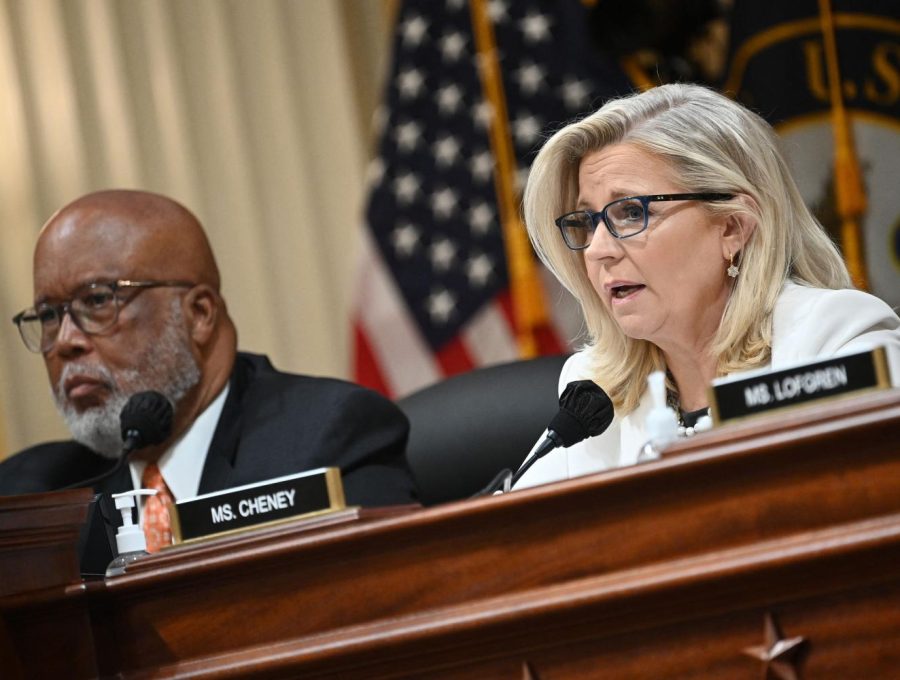January 6 Committee votes to Subpoena Trump in October 13 Hearing
October 27, 2022
On Thursday, October 13th, the ninth and possibly final public hearing of the January 6th panel took place, shedding new light on the investigation and bringing new evidence regarding the affiliation between former President Donald Trump and the attacks on the capitol that occurred on January 6th, 2021. The hearing was closed by a unanimous vote of the bipartisan nine-member committee to issue a subpoena to the former president for testimony.
Congressman Bennie Thompson, chairman of the January 6th committee opened the hearing with an impassioned speech regarding the purpose of the hearing and the panel’s investigation. Representative Thompson stated that Mr. Trump “is the one person at the center of the story of what happened on Jan. 6.” He reminded the public that the committee’s investigation was non-partisan, with the majority of the evidence gathered coming from former White House aides and Republican officials.
During the hearing, the panel presented evidence and testimony from multiple officials covering the events leading up to and during the insurrection. Representative Zoe Lofgren said that the panel was informed by Mr. Trump’s former campaign manager Brad Parscale that Mr. Trump planned to insist he had won as early as July 2020, regardless of the results of the election. Other White House officials testified that the former president was privately admitting to his loss, telling Chairman of the Joint Chiefs of Staff Mark Milley something to the effect of, “we lost, we need to let that issue go to the next guy.”
Near the end of the hearing, the panel showed a video of congressional officials, including Democrats like House Speaker Nancy Pelosi and Republicans like Senator Mitch McConnell. They were removed to a secure location during the riots, and after being evacuated, Speaker Pelosi said, “There has to be some way we can maintain the sense that people have… that [the] government can function, and that we can elect a President of the United States.” Following this, Speaker Pelosi and her colleagues were informed that lawmakers on the floor were wearing tear gas masks in preparation for a breach.
Footage of House members mid-evacuation was interspersed with that of rioters inside the Capitol Building, with one shouting at guards “Bring [Speaker Pelosi] out! We’re coming in if you don’t bring her out!” Amidst this, we see pleas from the evacuated congressional leaders for the National Guard to be called in to quell the riot. Senator Chuck Schumer is seen asking the then-acting Attorney General Jeffrey Rosen to have then-President Trump call an end to the attack, while Republican leaders including Senator McConnell and Representative Steve Scalise join in with phone calls for aid.
Unlike the congressional officials who were under siege by the insurrectionists at the Capitol, Mr. Trump, as the panel reminds the public, did not call for an end to the attack. In many ways, the then-sitting President did the opposite, firing up his supporters before their march on the Capitol with a speech in which he told them “if you don’t fight like hell, you’re not going to have a country anymore.”
When former Vice President Mike Pence released a public letter in defiance of Mr. Trump’s orders to exclude certain electoral votes, Mr. Trump released a tweet expressing his disappointment which would gain more than twenty-four thousand likes in two minutes. Former Twitter employee Anika Navaroli testified that rioters were “literally calling for assassination” as the tweet went out.
A video testimony was presented in which Mick Mulvaney, one of Mr. Trump’s former Chiefs of Staff, confirms an account by GOP Representative Jaime Herrera Beutler on a phone call on January 6th between Mr. Trump and Republican Leader Kevin McCarthy. Representative McCarthy had allegedly asked Mr. Trump to call off his supporters while his staff was “running for their lives.” Beutler said the then-president responded, “I guess they’re just more upset about the election theft than you are.”
Mr. Mulvaney corroborated this in his testimony, stating that “The president told them something along the lines of, ‘Kevin, maybe these people are just more angry about this than you are. Maybe they’re more upset.’”
The panel reiterated that Mr. Trump, as the then-sitting president, needed to be held accountable for continuously attempting to overthrow the election results. Congressman Thompson said that Mr. Trump “tried to take away the voice of the American people in choosing their president and replace the will of the voters with his will to remain in power.”
Representative Liz Cheney added, “Our nation cannot only punish the foot soldiers who stormed our Capitol. With every effort to excuse or justify the conduct of the former president, we chip away at the foundation of our Republic.” She urged the public to consider whether or not our country can last for another two hundred years if we do not hold those like Mr. Trump accountable.
To conclude the hearing, the panel voted on whether or not Mr. Trump should be subpoenaed for documents and testimony. The vote was recorded, with all nine panel members voting unanimously for the resolution.



